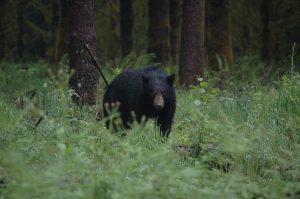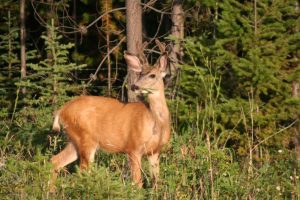 The Malcolm Knapp Research Forest is home to a variety of wildlife- some you may see and many you will not. Please be aware that we are sharing their habitat and we must be respectful of this. While most wildlife does not want to interact with humans, sometimes your paths may cross. Here are some steps to keep yourself and wildlife safe while in the forest:
The Malcolm Knapp Research Forest is home to a variety of wildlife- some you may see and many you will not. Please be aware that we are sharing their habitat and we must be respectful of this. While most wildlife does not want to interact with humans, sometimes your paths may cross. Here are some steps to keep yourself and wildlife safe while in the forest:
- Be prepared- know the types of animals you may encounter in the area you are going.
- Be loud- talk loudly, stomp your feet, clap your hands or carry a bear bell to let wildlife know you are nearby. Note that the sound from a bear bell does not carry as far as the sound of human voices.
- Stay on the trails- stay on marked trails to protect the surrounding habitat and avoid stumbling upon unsuspecting wildlife.
- Bring a friend- groups of 3 or more tend to make more noise and deter wildlife.
- Be aware of your surroundings- be alert and keep a watchful eye. Watch for signs of large animals such as tracks, scat, scratch marks on trees or overturned logs.
- Be especially vigilant when walking alongside running water, in thick bush or if there is a strong wind blowing. Animals will be less likely to hear you and there is a greater chance for a surprise encounter.
- Never feed wildlife.
Tips When Encountering a Black Bear*:
Black bears are often seen close to the main gate of the research forest and on the trails. Do not approach a black bear, and never get between a mother and her cubs. If you encounter a black bear:
- Assess what type of encounter it is- defensive or predatory. A defensive encounter will usually be marked by a lot of noise by the bear and a head rush on you.
- Hold your ground and pull out your bear spray (if you have it) and release the safety.
- Speak to the bear in a loud low voice “Whoa- you better back off!”
- If the bear continues its charge and closes within 5-10 meters, deploy your bear spray in a short burst, aiming from the ground up to create a wall between you and the bear. When the bear retreats, head back to your vehicle and contact the Conservation Officer Reporting line as soon as possible. Alert others in the area to the presence of the aggressive bear.
- If the bear breaks off its charge before you have to deploy your spray- take a step or two back away from the bear. Continue to speak in a low voice. Do not make direct eye contact with the bear. Keep your bear spray at the ready. Once the bear know you are not a threat it should leave or return to what it was protecting. Continue to back away and keep an eye on the bear. Return to your vehicle and alert those in the area to the presence of an aggressive bear.
Tips When Encountering a Cougar*:
Cougars live all throughout the research forest, though are rarely spotted. Attacks by cougars are rare, but can be fatal, especially if young children are involved. If you encounter a cougar, keep calm. Make yourself look as large as possible and back away slowly, keeping the cougar in view and allowing a clear exit for the cougar. Pick up children and small pets immediately. Never run or turn your back- sudden movements may provoke an attack.
If you notice that a cougar is watching you, maintain eye contact with the cougar and speak to it in a loud firm voice. Reinforce the fact that you are a human and not an easy target. Back out of the area and seek assistance or shelter.
If a cougar shows aggression, or begins following you, respond aggressively in all cases as cougars see you as a meal: keep eye contact, yell and make loud noises, and show your teeth. Pick up nearby sticks, rocks, or whatever you have at hand to quickly use as a weapon if necessary- crouch down as little as possible when picking up things off the ground. If a cougar attacks, fight back, focusing on its facial and eye area. Use rocks, sticks, bear spray or personal belongings as weapons. Try to convince the cougar you are a threat, not prey.
 Tips When Encountering a Deer*:
Tips When Encountering a Deer*:
Deer can frequently be seen when visiting the research forest, in the arboretum, at the front gate and even on the road leading to the forest. If you encounter a deer:
- Give them space. We all enjoy viewing wildlife, but it is important to respect them and give them enough space to avoid them feeling threatened and as a result defending themselves.
- If you are attacked by a deer, stay upright, cover your head with your arms and move to shelter.
- Leave fawns alone. If you come across fawns while out hiking, do not touch them. Back away from the area and leave them be. Does will hide their young while they feed, returning occasionally to nurse. By disturbing the fawn you greatly decrease its chance of survival.
*Information adapted from www.wildsafebc.com